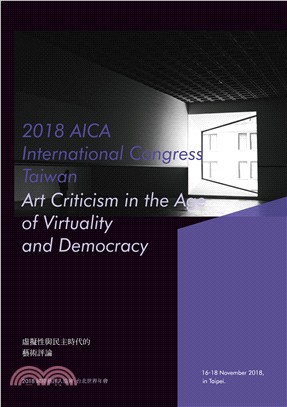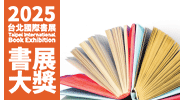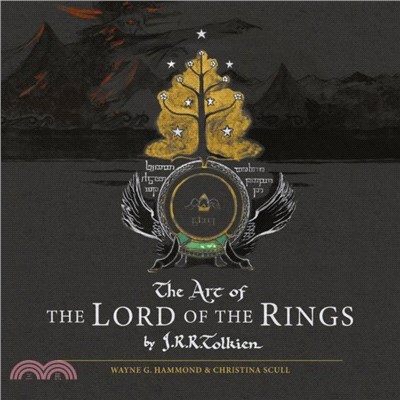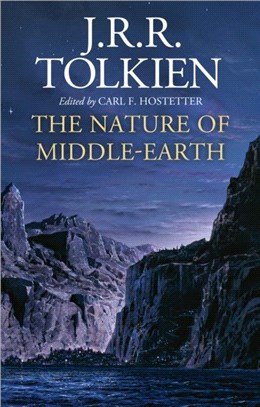定價
:NT$ 600 元優惠價
:90 折 540 元
無庫存,下單後進貨(採購期約4~10個工作天)
下單可得紅利積點:16 點
商品簡介
作者簡介
目次
相關商品
商品簡介
Art Criticism in the age of Virtuality and Democracy「虛擬性與民主時代的藝術評論」--2018國際藝評人協會 台北世界年會 會議論文集Preface
Congress theme for 2018 AICA International Congress Taiwan:Art Criticism in the Age of Virtuality and Democracy
⓪ Chi-Ming Lin, and the scientific committee of AICA Taiwan
Based on observations of important tendencies in the actual world, we would like to address some key issues concerning the role of art criticism related to these new developments.
Firstly, the virtual is not the opposite of reality but rather an increasing part of our reality. Presently, communities, social relations, everyday life, the body, and even biological life are in the processes of mass virtualization. Life itself has been supposed as an algorithm, AI as a brain without body, while space-time’s relationship is virtualized in VR technology. A virtual enterprise need no longer convene its employees onsite, but rather can delegate work to be done remotely, thus re-articulating the time-space relationship of its workers.
Secondly, if we make an observation of a longer duration, there seems to be an unquestionable expansion of democracy which can be confirmed by the democratic transitions beginning in the mid-1970s, which span from Latin America to Taiwan and South Korea, through the end of the cold war, and to following transitions in Eastern Europe, the Color Revolution and the Umbrella Movement in Hong-Kong in the fall of 2014. Nevertheless in more recent years, the phenomenon of the retreat of democracy can also be observed in the uprising of the populism worldwide.
Moreover, these two tendencies may be related. The Congress Theme “Art Criticism in the age of Virtuality and Democracy” has two sub-themes:
1. Art criticism in the age of virtuality
2. Art discourse facing challenged democracy
1. “Art criticism in the age of virtuality” will address the situation in which the rapid pace of development in computer and media technologies is creating new working environments and new possibilities for art, each with their own particular problematics. How does this process affect the description, interpretation and evaluation of contemporary art? More precisely, does art criticism develop new methodology and new languages concerning its analysis and new problematics in its debates? What does it mean for art and art criticism that new media reaches crowds of new readers around the world, often “for free”?
2. “Art discourse facing challenged democracy” will discuss the following questions: how is art discourse constitutive of the collective representations and imaginary of democracy? In the situation of democracy under challenge, how are these social-political phenomena reflected in new developments of censorship and self-censorship, or post-truth? For new problems brought out by transitional justice, what kind of function can art discourse play?
Acknowledgment
AICA Taiwan would like to express our special thanks of gratitude to all 35 of the contributors for submitting their impressive works, and the President of AICA International-Lisbeth Rebollo Gonçalves, Honorary President- Jacques Leenhardt, Secretary General-Allthorpe-Guyton Marjorie, Treasurer-Mathilde Roman, and Office Assistant- Nathalie Rousselle for their great help. This book would not have been possible without the financial or the organizational support of the Ministry of Culture, Ministry of Science and Technology, Ministry of Foreign Affairs, and the Ministry of Education of Taiwan(R.O.C). Also, we appreciate the kind support from Taipei City Government, Taipei Fine Art Museum, National Taipei University of Education:
Department of Arts and Design, Critical and Curatorial Studies of Contemporary Art at NTUE, Museum of NTUE, Department of Music. Special thanks to the sponsorships from the private association-Xue Xue Foundation, Taishin Holdings and Foundation for Arts and Culture, Cathay Century Insurance, Egret Foundation, and Bonyu Ltd.
We are grateful to both jury panels for “AICA Prize for Distinguished Contribution for Art Criticism” and “AICA Incentive Award for Young Art Critics”: Hsiang-Lin Lai, Kuang-Yi Chen, Po-Shin Chiang, Ya-Chun Chin, Tzu-Chieh Chien, Ching-Wen Chang, Yang YEUNG, Nhung WALSH, Chien-Mei LIU, Jeannine TANG, Damian Smith, and Mariko Takeuchi. Also special thanks to AICA Taiwan Preparatory Committee and the Scientific Committee-Hai-Ming Huang, Hsien-Hung Yang, Shui-Peng Cheng, Chau-Hsin Chen, Ching-Wen Chang, LI-Fu Chen, Lin-Yen Tsai, Mu-Ching Wu, Pei-Ni Hsieh, Chi-Hsiang Chen, Yi-Hua Wu, Hung-Yi Chen, Man-Ray Hsu, Hong-John Lin, Sheng-Hua Zheng, Chih-Yung Chiu, Wen-Hao Huang. Furthermore, We thank the President of AICA Taiwan and the editor in chief of this book, Chi-Min Lin along with the editing working team-Tien-Han Chang, Shih-Ting Wang, Cheng-Hao Liou, E-Fahn Wang, Shih-Hsuan Chou, and Sean Gaffney- for their efforts.Art Criticism in the age of Virtuality and Democracy
The Congress Theme addresses some key issues concerning the role of art criticism related to the new tendencies.
Firstly, the virtual is not the opposite of reality but rather an increasing part of our reality. Presently, communities, social relations, everyday life, the body, and even biological life are in the processes of mass virtualization. Life itself has been supposed as an algorithm, AI as a brain without body, while space-time’s relationship is virtualized in VR technology. A virtual enterprise need no longer convene its employees onsite, but rather can delegate work to be done remotely, thus re-articulating the time-space relationship of its workers.
Secondly, if we make an observation of a longer duration, there seems to be an unquestionable expansion of democracy which can be confirmed by the democratic transitions beginning in the mid-1970s, which span from Latin America to Taiwan and South Korea, through the end of the cold war, and to following transitions in Eastern Europe, the Color Revolution and the Umbrella Movement in Hong-Kong in the fall of 2014. Nevertheless in more recent years, the phenomenon of the retreat of democracy can also be observed in the uprising of the populism worldwide.
Two sub-themes:
1.Art criticism in the age of virtuality
2.Art discourse facing challenged democracy
1.Art criticism in the age of virtuality: How does the situation in which the rapid pace of development in computer and media technologies affect the description, interpretation and evaluation of contemporary art? More precisely, does art criticism develop new methodology and new languages concerning its analysis and new problematics in its debates?
2.Art discourse facing challenged democracy: How is art discourse constitutive of the collective representations and imaginary of democracy? In the situation of democracy under challenge, how are these social-political phenomena reflected in new developments of censorship and self-censorship, or post-truth? For new problems brought out by transitional justice, what kind of function can art discourse play?
Congress theme for 2018 AICA International Congress Taiwan:Art Criticism in the Age of Virtuality and Democracy
⓪ Chi-Ming Lin, and the scientific committee of AICA Taiwan
Based on observations of important tendencies in the actual world, we would like to address some key issues concerning the role of art criticism related to these new developments.
Firstly, the virtual is not the opposite of reality but rather an increasing part of our reality. Presently, communities, social relations, everyday life, the body, and even biological life are in the processes of mass virtualization. Life itself has been supposed as an algorithm, AI as a brain without body, while space-time’s relationship is virtualized in VR technology. A virtual enterprise need no longer convene its employees onsite, but rather can delegate work to be done remotely, thus re-articulating the time-space relationship of its workers.
Secondly, if we make an observation of a longer duration, there seems to be an unquestionable expansion of democracy which can be confirmed by the democratic transitions beginning in the mid-1970s, which span from Latin America to Taiwan and South Korea, through the end of the cold war, and to following transitions in Eastern Europe, the Color Revolution and the Umbrella Movement in Hong-Kong in the fall of 2014. Nevertheless in more recent years, the phenomenon of the retreat of democracy can also be observed in the uprising of the populism worldwide.
Moreover, these two tendencies may be related. The Congress Theme “Art Criticism in the age of Virtuality and Democracy” has two sub-themes:
1. Art criticism in the age of virtuality
2. Art discourse facing challenged democracy
1. “Art criticism in the age of virtuality” will address the situation in which the rapid pace of development in computer and media technologies is creating new working environments and new possibilities for art, each with their own particular problematics. How does this process affect the description, interpretation and evaluation of contemporary art? More precisely, does art criticism develop new methodology and new languages concerning its analysis and new problematics in its debates? What does it mean for art and art criticism that new media reaches crowds of new readers around the world, often “for free”?
2. “Art discourse facing challenged democracy” will discuss the following questions: how is art discourse constitutive of the collective representations and imaginary of democracy? In the situation of democracy under challenge, how are these social-political phenomena reflected in new developments of censorship and self-censorship, or post-truth? For new problems brought out by transitional justice, what kind of function can art discourse play?
Acknowledgment
AICA Taiwan would like to express our special thanks of gratitude to all 35 of the contributors for submitting their impressive works, and the President of AICA International-Lisbeth Rebollo Gonçalves, Honorary President- Jacques Leenhardt, Secretary General-Allthorpe-Guyton Marjorie, Treasurer-Mathilde Roman, and Office Assistant- Nathalie Rousselle for their great help. This book would not have been possible without the financial or the organizational support of the Ministry of Culture, Ministry of Science and Technology, Ministry of Foreign Affairs, and the Ministry of Education of Taiwan(R.O.C). Also, we appreciate the kind support from Taipei City Government, Taipei Fine Art Museum, National Taipei University of Education:
Department of Arts and Design, Critical and Curatorial Studies of Contemporary Art at NTUE, Museum of NTUE, Department of Music. Special thanks to the sponsorships from the private association-Xue Xue Foundation, Taishin Holdings and Foundation for Arts and Culture, Cathay Century Insurance, Egret Foundation, and Bonyu Ltd.
We are grateful to both jury panels for “AICA Prize for Distinguished Contribution for Art Criticism” and “AICA Incentive Award for Young Art Critics”: Hsiang-Lin Lai, Kuang-Yi Chen, Po-Shin Chiang, Ya-Chun Chin, Tzu-Chieh Chien, Ching-Wen Chang, Yang YEUNG, Nhung WALSH, Chien-Mei LIU, Jeannine TANG, Damian Smith, and Mariko Takeuchi. Also special thanks to AICA Taiwan Preparatory Committee and the Scientific Committee-Hai-Ming Huang, Hsien-Hung Yang, Shui-Peng Cheng, Chau-Hsin Chen, Ching-Wen Chang, LI-Fu Chen, Lin-Yen Tsai, Mu-Ching Wu, Pei-Ni Hsieh, Chi-Hsiang Chen, Yi-Hua Wu, Hung-Yi Chen, Man-Ray Hsu, Hong-John Lin, Sheng-Hua Zheng, Chih-Yung Chiu, Wen-Hao Huang. Furthermore, We thank the President of AICA Taiwan and the editor in chief of this book, Chi-Min Lin along with the editing working team-Tien-Han Chang, Shih-Ting Wang, Cheng-Hao Liou, E-Fahn Wang, Shih-Hsuan Chou, and Sean Gaffney- for their efforts.Art Criticism in the age of Virtuality and Democracy
The Congress Theme addresses some key issues concerning the role of art criticism related to the new tendencies.
Firstly, the virtual is not the opposite of reality but rather an increasing part of our reality. Presently, communities, social relations, everyday life, the body, and even biological life are in the processes of mass virtualization. Life itself has been supposed as an algorithm, AI as a brain without body, while space-time’s relationship is virtualized in VR technology. A virtual enterprise need no longer convene its employees onsite, but rather can delegate work to be done remotely, thus re-articulating the time-space relationship of its workers.
Secondly, if we make an observation of a longer duration, there seems to be an unquestionable expansion of democracy which can be confirmed by the democratic transitions beginning in the mid-1970s, which span from Latin America to Taiwan and South Korea, through the end of the cold war, and to following transitions in Eastern Europe, the Color Revolution and the Umbrella Movement in Hong-Kong in the fall of 2014. Nevertheless in more recent years, the phenomenon of the retreat of democracy can also be observed in the uprising of the populism worldwide.
Two sub-themes:
1.Art criticism in the age of virtuality
2.Art discourse facing challenged democracy
1.Art criticism in the age of virtuality: How does the situation in which the rapid pace of development in computer and media technologies affect the description, interpretation and evaluation of contemporary art? More precisely, does art criticism develop new methodology and new languages concerning its analysis and new problematics in its debates?
2.Art discourse facing challenged democracy: How is art discourse constitutive of the collective representations and imaginary of democracy? In the situation of democracy under challenge, how are these social-political phenomena reflected in new developments of censorship and self-censorship, or post-truth? For new problems brought out by transitional justice, what kind of function can art discourse play?
作者簡介
AICA
The International Association of Art Critics (AICA) was founded in 1950 and was admitted in 1951 to the rank of NGO. AICA comprises various experts anxious to develop international cooperation in the fields of artistic creation, dissemination and cultural development.
AICA brings together around 5,000 art professionals from 95 countries all over the world, organised into 63 National Sections and an Open Section. The most recent Annual International Congresses to be organised by AICA have held in Poland (2013), Seoul, South Korea (2014), London, England (2015), Havana, Cuba (2016), and Paris, France (2017).
The members of AICA includes art critics, art historians and art educators, as well as curators from museums of modern art. Their aim is to compare their point of views concerning the vocation of art criticism, to analyse their responsibility in regard to artists and public, and to outline the particular nature of their contributions in relation to developments in the fields of art history.
The International Association of Art Critics (AICA) was founded in 1950 and was admitted in 1951 to the rank of NGO. AICA comprises various experts anxious to develop international cooperation in the fields of artistic creation, dissemination and cultural development.
AICA brings together around 5,000 art professionals from 95 countries all over the world, organised into 63 National Sections and an Open Section. The most recent Annual International Congresses to be organised by AICA have held in Poland (2013), Seoul, South Korea (2014), London, England (2015), Havana, Cuba (2016), and Paris, France (2017).
The members of AICA includes art critics, art historians and art educators, as well as curators from museums of modern art. Their aim is to compare their point of views concerning the vocation of art criticism, to analyse their responsibility in regard to artists and public, and to outline the particular nature of their contributions in relation to developments in the fields of art history.
目次
Preface/Chi-Ming Lin and the Scientific Committee of AICA Taiwan
Contributors
Forking Democracy/Audrey Tang
The Matrix of Visibility and Legitimacy: Art and Democracy in the Age of Digital Participation/Nikos Papastergiadis
Seventy Years of AICA, Reflected Through the PRISME Research Project:Some Preliminary Findings from the Archives in Rennes/Henry Meyric Hughes
The Poetics and Politics of Shane Cullen’s ‘The Agreement’/Liam Kelly
Trajective Art Criticism: Boats (Trains, Planes) and Home in the Era of Retreat from Democracy/Richard Read
The Illusion of Art Without Mediation: Challenging the Challenged Democracy/Rui Gonçalves Cepeda
On “Art Criticism in the Age of Virtuality”/Lisbeth Bonde
Turbulence: How Can Creativity and Art Criticism Respond to Unsettling Times in the Age of Virtuality?/Natalie King
The Post-Internet Way of Art Criticism/Ewa Wójtowicz
Aesthetic of Protest: The Colorful Revolution/Jovanka Popova and Mira Gacina
A Field of Non-Field/Chieh-Jen Chen
Notes on the Causes/Chieh-Jen Chen and Chien-Hung Huang
Truth or Post-Truth?/Rahma Khazam
A Brave New Virtual World?/Elisa Rusca
The Image War of Chiang Kai-shek’s Statues: The State of Exception in the Process of Promoting Transitional Justice in Taiwan/Kang-Jung Chan
No More Professional Writers in the Future?/Agnieszka Sural
Unlimited Uncertainty: A Critical Narrative of Art Self-Powered by the Virtual/Lisa Paul Streitfeld
Politics of Performance Art Before and After 1989/Małgorzata Kaźmierczak
Art as Events with the Virtual: Rethinking about the Democracy and Bureaucracy/Raylin Tsai
The Post-Enlightenment Fallacy: Political Art and the Fate of Aesthetics/Joe Nolan
Within Digital Culture: The Hyperimage Perspective on Art and Criticism/Alfredo Cramerotti
Total Control and Censorship: Towards a New Humanity?/Bernhard Serexhe
Eco-Democracy and the Romanian Contemporary Public Art/Marilena Preda Sanc
To the Moon/Laurie Anderson and Hsin-Chien Huang
On “Art Discourse Facing Challenged Democracy”/Bélgica Rodríguez
Exploring Robots/robotlab
AICA-USA Online: Being Effective, Virtual, and Real in the Twenty-First Century/Judith E. Stein and Jamie Keesling
Hyperallergic: A Model for Art Criticism and Cultural in the Digital Age/Holly Crawford
An Eco-System of Criticism-Activism to Empower “Overcoming the Past”-Film Discourse and 〈NN 15〉 Community Project of Taiwan’s White Terror Memory/Yu-Juin Wang
Xiao Lu’s Dialogue/Damian Smith
Arctic Environmental Challenges through Virtuality/Jean Bundy
Contemporary Art, Democratization and Social Change:Politics of Art in Postcolonial Buddhist Sri Lanka/Sabine Grosser
A Theater - in Absence/Felix Ho Yuen Chan
In Search of a Critical Conscience/Ernesto Muñoz
Contributors
Forking Democracy/Audrey Tang
The Matrix of Visibility and Legitimacy: Art and Democracy in the Age of Digital Participation/Nikos Papastergiadis
Seventy Years of AICA, Reflected Through the PRISME Research Project:Some Preliminary Findings from the Archives in Rennes/Henry Meyric Hughes
The Poetics and Politics of Shane Cullen’s ‘The Agreement’/Liam Kelly
Trajective Art Criticism: Boats (Trains, Planes) and Home in the Era of Retreat from Democracy/Richard Read
The Illusion of Art Without Mediation: Challenging the Challenged Democracy/Rui Gonçalves Cepeda
On “Art Criticism in the Age of Virtuality”/Lisbeth Bonde
Turbulence: How Can Creativity and Art Criticism Respond to Unsettling Times in the Age of Virtuality?/Natalie King
The Post-Internet Way of Art Criticism/Ewa Wójtowicz
Aesthetic of Protest: The Colorful Revolution/Jovanka Popova and Mira Gacina
A Field of Non-Field/Chieh-Jen Chen
Notes on the Causes/Chieh-Jen Chen and Chien-Hung Huang
Truth or Post-Truth?/Rahma Khazam
A Brave New Virtual World?/Elisa Rusca
The Image War of Chiang Kai-shek’s Statues: The State of Exception in the Process of Promoting Transitional Justice in Taiwan/Kang-Jung Chan
No More Professional Writers in the Future?/Agnieszka Sural
Unlimited Uncertainty: A Critical Narrative of Art Self-Powered by the Virtual/Lisa Paul Streitfeld
Politics of Performance Art Before and After 1989/Małgorzata Kaźmierczak
Art as Events with the Virtual: Rethinking about the Democracy and Bureaucracy/Raylin Tsai
The Post-Enlightenment Fallacy: Political Art and the Fate of Aesthetics/Joe Nolan
Within Digital Culture: The Hyperimage Perspective on Art and Criticism/Alfredo Cramerotti
Total Control and Censorship: Towards a New Humanity?/Bernhard Serexhe
Eco-Democracy and the Romanian Contemporary Public Art/Marilena Preda Sanc
To the Moon/Laurie Anderson and Hsin-Chien Huang
On “Art Discourse Facing Challenged Democracy”/Bélgica Rodríguez
Exploring Robots/robotlab
AICA-USA Online: Being Effective, Virtual, and Real in the Twenty-First Century/Judith E. Stein and Jamie Keesling
Hyperallergic: A Model for Art Criticism and Cultural in the Digital Age/Holly Crawford
An Eco-System of Criticism-Activism to Empower “Overcoming the Past”-Film Discourse and 〈NN 15〉 Community Project of Taiwan’s White Terror Memory/Yu-Juin Wang
Xiao Lu’s Dialogue/Damian Smith
Arctic Environmental Challenges through Virtuality/Jean Bundy
Contemporary Art, Democratization and Social Change:Politics of Art in Postcolonial Buddhist Sri Lanka/Sabine Grosser
A Theater - in Absence/Felix Ho Yuen Chan
In Search of a Critical Conscience/Ernesto Muñoz
主題書展
更多
主題書展
更多書展今日66折
您曾經瀏覽過的商品
購物須知
為了保護您的權益,「三民網路書店」提供會員七日商品鑑賞期(收到商品為起始日)。
若要辦理退貨,請在商品鑑賞期內寄回,且商品必須是全新狀態與完整包裝(商品、附件、發票、隨貨贈品等)否則恕不接受退貨。
















































